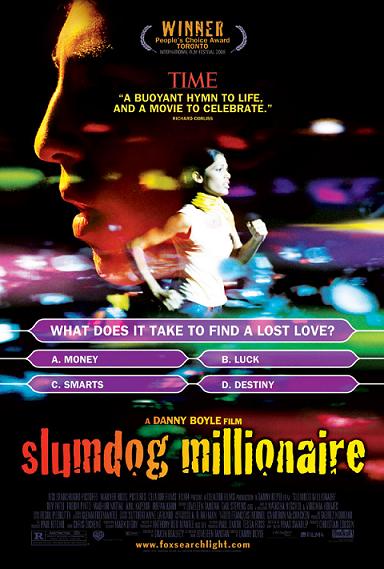I've had a few first viewings of movies recently, and I've had recent repeat vieweings of what, IMHO, were the best films of 2007 and 2008 respectively. Rather than write them all up separately, I'm going to take them all in one post. 
Slumdog Millionaire is, at its heart, a romantic drama. This made me shy away from it at first; I'm usually not keen on romantic pictures (though one could argue that Casablanca falls into that category, and I certainly dig that one). Also, I wondered whether the movie would ignore the reality of the slums from which the slumdog protagonist came. I'm not one to have my nose rubbed in injustice and inequality, but sugarcoating offends me.
My initial wariness about this film turned out to be unwarranted. Slumdog Millionaire brilliantly and boldly walks a fine line between pathos and fantasy as it tells the story of a boy and a girl who fell in love as children, lost each other, then found each other again after the boy found himself on India's version of Who Wants to be a Millionaire? The protagonists (Jamal Malik, his brother Salim, and their friend Latika) are Indian Muslims who are orphaned after a Hindu mob kills their mothers. Jamal (Dev Patel) falls for Latika (Frida Pinto), who is taken by a local gangster. Jamal rescues Latika, only to have her taken away and, presumably, raped by Salim, who murdered the gangster, and went to work for a second gangster. Jamal gets Latika's attention years later by getting himself on TV. He becomes a national hero as he answers questions correctly and Indians of all stripes make him the vehicle of their individual aspirations. In the end, boy gets girl and there's a fabulous production number at the main Mumbai train station.
The movie does not minimize poverty, violence, or injustice--or, for that matter, enhanced interrogation techniques--nor does it emphasize them to the point of preachiness. Kids grow up in slums all over the world; some get bitter and cynical and go outlaw (Salim); some work legally and hang on to their dreams (Jamal). And everybody roots for the underdog.
Slumdog Millionaire is a nice film to watch on BluRay. It is very colorful and vibrant, and some of the actors are attractive enough to want to see them in hi-def.
My DW is a big Dan Brown fan, so, as a matter of public record, I liked Angels and Demons a whole hell of a lot. That out of the way, it was a pretty average movie, and, like the film version of The Da Vinci Code, shows that some visual images that work in the imagination on the written page do not work particularly well on the silver screen. 

IMHO, There Will be Blood was the best film of 2007 and The Dark Knight was the best of 2008. I recently viewed both films for the first time since the Panic of Fall 2008. The last couple of scenes of There Will be Blood, in which a crazed, wealthy oilman self-destructs, now seems an apt metaphor for the end of an era of dangerously self-indulgent, unregulated market capitalism. The Joker's wild anarchy in The Dark Knight, driving the citizens of Gotham into a state of utter panic, doesn't really seem so far-fetched in light of the near-collapse of the financial markets and the the near-panic of the pig flu--and this after the movie raised provocative questions about privacy rights and the lengths to which a civilized society can go against malefactors before we become malefactors ourselves. One point that Hurricane Katrina, the Panic, Al Qaeda's insanity, and some elements of our reaction to terrorism have driven home to me is that the veneer of our open, law-bound, refined, wealthy civilization that we've spent centuries pasting on top of the Hobbesian state of nature is thinner than many of us would like to think. The Dark Knight makes this point without being didactic or obnoxious about it.
Wednesday, May 27, 2009
The Good, the Bad, and the Classic
Subscribe to:
Post Comments (Atom)

No comments:
Post a Comment